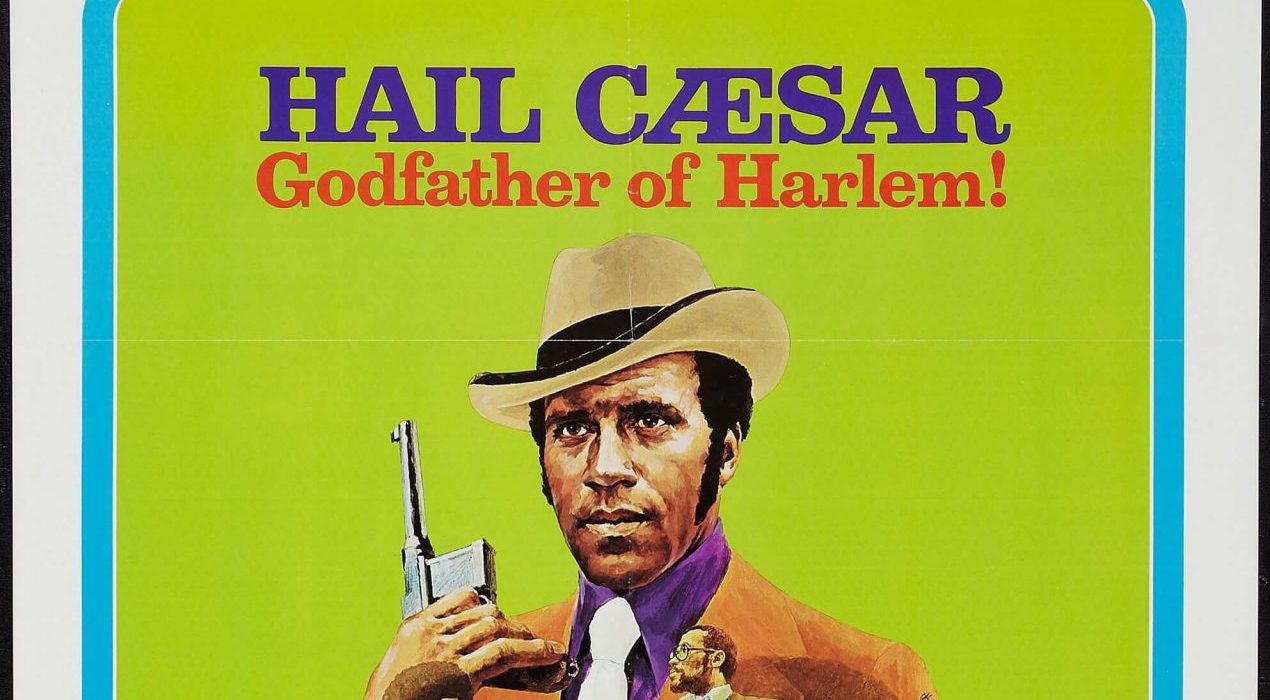Starring: Fred Williamson, Gloria Hendry, D’Urville Martin and Julius Harris
Rated: R Action/Crime/Drama
Riding the wave of the Blaxploitation era, Black Caesar exploded on the scene, tantalizing Black moviegoers! Black Caesar is considered to be a remake of the 1931 film, Little Caesar, which starred Edward G. Robinson as the titular character. This remake centers upon the lead character, Tommy Gibbs (Fred Williamson). The film opens with Tommy, born into extreme poverty in the Harlem community, as a young teen in the late 1950s. Willing to improve his lot in life at any costs, he becomes involved in a mob-related incident that causes him to be viciously assaulted by a corrupt and racist cop, McKinney (Art Lund).
This assault propels Gibbs towards a life of crime. He becomes the head of a Black crime family that serves under a branch, led by Cardoza (Val Avery), of the Mafia. In building his own Black criminal syndicate, Tommy engages in clashes with Mafia members and other enemies, including McKinney. In the midst of making multiple enemies, his closest personal relationships with his parents, Mama Gibbs and Papa Gibbs (Minnie Gentry and Julius Harris); girlfriend, Helen Bradley (Gloria Hendry) and best friends, Joe Washington (Philip Roye) and Reverend Rufus (D’Urville Martin) are tested. Adding to the conflict are secret details that keep Gibbs in power … but for how long?!
Black Caesar was such a box office success that Larry Cohen, who wrote, directed and produced the film, was immediately contacted to create a sequel. Cohen revealed various details behind the creation of this film in an interview, “Camera Q & A: Larry Cohen on His Films with Fred Williamson” featured in the Camera in the Sun. Tommy Gibbs, for example, was originally to be played by Sammy Davis, Jr. According to Cohen, Davis, Jr. had wanted a role that placed him as the star and a force to be reckoned with, as opposed to portraying his usual supporting role to one of the Rat Pack members, most notably, Frank Sinatra. Cohen had decided that the Tommy Gibbs character, like “Little Caesar”, would be a great vehicle because Edward G. Robinson as well as James Cagney were both diminutive men like Davis, Jr. Playing a gangster propelled their careers in directions previously excluded to them. Cohen was commissioned $10, 000 (USD) to create a script that detailed the rise of a Black gangster.
However, Sammy Davis, Jr. had financial troubles with the Internal Revenue Service (IRS) and Cohen was not paid for his script. He was approached by Samuel Z. Arkoff, of American International Pictures, who was anxious to produce a film starring a Black actor as the lead beause of the success of Blaxploitation films. Negotiations were agreed upon and the film was made. Needing a new lead character since Davis, Jr. was no longer an option, Cohen cast former football player-turned-actor, Fred Williamson. He had bit parts in films and on the television show, Julia, that starred Diahann Carroll, so he had a film presence.
Black Caesar was hugely successful was because of Williamson’s handsomeness and the power he exuded as a Black man who was an intelligent gangster. In the interview, Cohen declared, “He [Williamson] was a kind of a name actor for the Black exploitation-type film. And that’s what they called these pictures at the time, although I think every movie is an exploitation film. You’re trying to sell your tickets to your audience, so every movie has that element of exploitation. You publicize it. You promote it. You try to get people to pay to come in and see it. So, I don’t see what was any different about having a picture that would be geared to Black audiences. As a matter of fact, they had been denied the opportunity to see their people in heroic leading roles in movies, or anything glamorous or slick. Usually, they always had been pushed into the roles of servants or sidekicks. Or even as I said, Sammy Davis Jr. was playing a flunky. You know, in Ocean’s Eleven he was playing a garbage man. I mean, it’s disgraceful if you think about it.”
Black Caesar was filmed primarily in New York City, with several scenes filmed in Los Angeles. Cohen also shared in his interview that the crews of Across 110th Street, who were filming in Manhattan while he was making Black Caesar, were harassed and had monies extorted by gangsters in Harlem. However, Cohen, having no funds, offered the gangsters roles in his film instead. He recounts saying, “’Hey, can you guys act? I think you guys would be great to play Fred Williamson’s gangster sidekicks, and I’ll put you all in the movie.’ So, the next thing you know, they’re all in the movie, and I was shooting any place in Harlem I felt like. And these guys were great. Anything we wanted, anything we needed to get, they got for me. We kind of owned Harlem after that. And then when the picture finally opened, I put them in the poster too, so that the advertisements in the paper had these guys in it. And opening day at the Cinerama Theater on Broadway, these gangsters were down there in front of the theater signing autographs.”
Adding to its appeal to moviegoers was the soundtrack composed by the “Godfather of Soul”, James Brown. Fred Wesley, leader of his band, the JBs, contributed greatly to the soundtrack, as it was the first time that Brown created a score for a film. The greatest hit from Black Caesar LP would be “The Boss”. This cut in particular would be sampled often in hip-hop, most notably by Ice-T and Nas, and the title character’s names would be referenced by musical artists, including Public Enemy in “Burn Hollywood Burn” of Spike Lee’s, Bamboozled.
Because of its mass appeal to moviegoers, Black Caesar, would be followed up that year with a sequel, Hell Up in Harlem!

